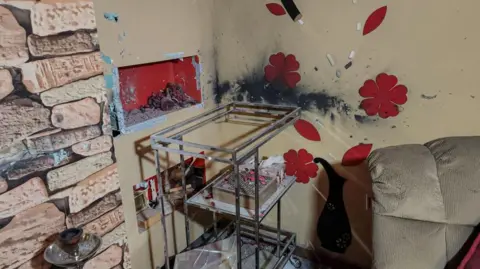Just as crowds had gathered to mourn some of those killed in Tuesday’s wave of pager-bomb attacks, an explosion sparked chaos in Dahiyeh, Hezbollah’s stronghold in southern Beirut.
A video captured the blast, showing a man lying on the ground and panicked people, some screaming, running away.
All this, moments before funerals were due to start for an 11-year-old boy and three Hezbollah members killed the previous day.
In the surrounding area there was bedlam as the sound of the explosion echoed through the streets. The chants stopped. Those gathered looked at each other, some incredulous.
As reports spread that this was part of a second wave of explosions now targeting walkie-talkies, no electronic equipment was considered safe.
Hezbollah supporters stopped our team several times, demanding we did not use our phones or our camera.
Lebanese officials said at least 20 people were killed and 450 others wounded across the country, with fires said to have broken out in dozens of homes, shops, and vehicles.
Already, the latest attacks are being seen as another humiliation for the Iranian-backed group, and a possible indication that its entire communication network may have been infiltrated by Israel.
Many people here are inevitably wondering what will come next.
This is a country still shocked and angered by what happened on Tuesday, when thousands of pagers exploded in that synchronised attack, after users received a message they believed had come from Hezbollah.
The devices detonated as people were in shops, or with their families at home, killing 12, including an eight-year-old girl and an 11-year-old boy, and injuring around 2,800.
Dr Elias Warrak told the BBC it was “the worst day of [his] life as a physician”. At least 60% of the people he had seen had lost at least one eye, he said, with many also losing a finger or a whole hand.
“I believe the number of casualties and the type of damage that has been done is humongous,” he said. “Unfortunately, we were not able to save a lot of eyes, and unfortunately the damage is not limited to the eyes – some of them have damage in the brain in addition to any facial damage.”
Reports suggest a shipment of pagers may have been rigged with explosives, before being detonated remotely.
Hezbollah had distributed the pagers amid concerns that smartphones were being used by the Israeli military and intelligence agencies to track down and kill its members. It was still not clear how Wednesday’s attacks might have been carried out.

But Hezbollah has vowed to respond, blaming Israel for the attacks. As usual, Israel has not commented.
Fears are, again, rising that the current violence between the two rivals, which has led to the displacement of tens of thousands of residents on both sides of the border, could escalate into an all-out war.
Hezbollah says its attacks on Israel, which started almost a year ago, are in solidarity with Palestinians in Gaza, and that they will only stop with a ceasefire, an elusive possibility for now.
Mourners who spoke to the BBC at the Dahiyeh funeral also struck a defiant tone.
One young man said: “The pain is huge, physical and in the heart. But this is something we are used to, and we will continue with our resistance.”
A 45-year-old woman told the BBC: “This will make us stronger, whoever has lost an eye will fight with the other eye and we are all standing together.”
Hours after the latest explosions, the Israeli defence minister, Yoav Gallant, said his country was “at the start of a new phase in the war”, as the 98th division of the Israeli army relocated from Gaza to the north of Israel.
Up until now, Hezbollah has indicated that it is not interested in another major war with Israel, as Lebanon struggles to recover from a years-long economic crisis. Many here say a conflict is not in the country’s interests.
But some will certainly demand a strong response. An indication of what Hezbollah might be planning to do could come on Thursday, in the first public reaction by its powerful leader, Hassan Nasrallah.













